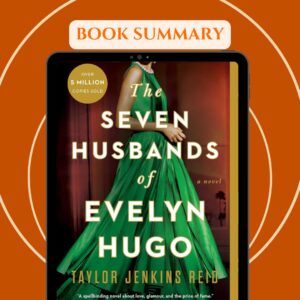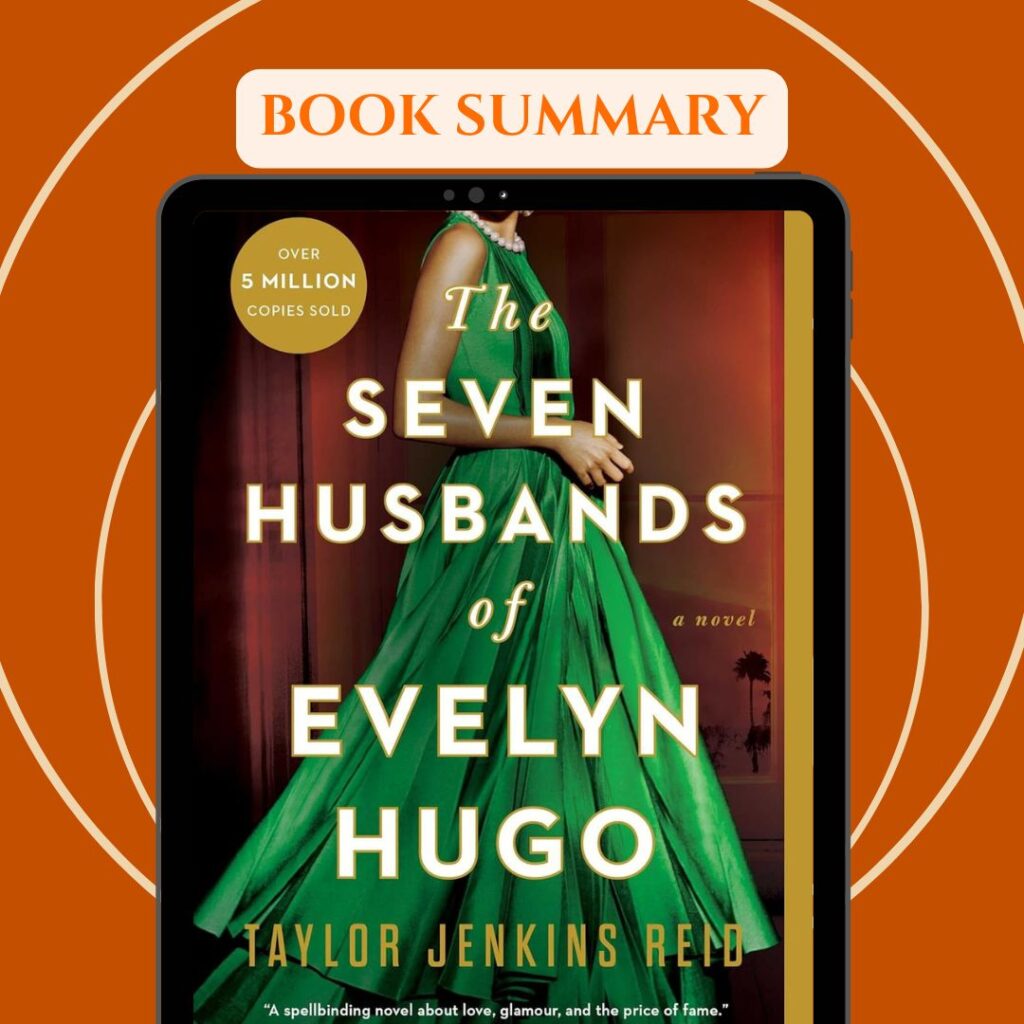The Seven Husbands of Evelyn Hugo – Full Book Summary
The Seven Husbands of Evelyn Hugo, written by Taylor Jenkins Reid, is a captivating novel that explores the life of a fictional Hollywood star, Evelyn Hugo. At 79 years old, Evelyn decides to reveal her tumultuous life story to Monique Grant, a struggling journalist. Through their conversations, Evelyn recounts her rise to fame, her seven marriages, and the complexities of love, ambition, and identity in a world that often seeks to define her.

Table of Contents
Plot Overview
The narrative begins with Evelyn reaching out to Monique Grant for an exclusive interview as she prepares to auction her iconic dresses. Monique is initially puzzled by Evelyn’s choice but seizes the opportunity to learn about the legendary actress’s life. As Evelyn narrates her story, it becomes clear that her life is filled with both triumphs and tragedies, shaped by her relentless ambition and the societal constraints she faced as a Cuban-American bisexual woman in mid-20th century America.
Early Life and Rise to Fame
Evelyn’s journey starts in Hell’s Kitchen, New York City, where she grows up in poverty. Her mother’s death and her father’s abusive nature push her to seek a better life. At just 15, she marries Ernie Diaz, a man who offers her a chance to escape to Hollywood. This marriage is strategic; Evelyn uses it as a stepping stone to achieve her dreams of stardom. Once in Hollywood, Evelyn learns that her beauty and sexuality can be powerful tools. She navigates the male-dominated film industry by marrying men who can further her career while simultaneously engaging in relationships that fulfill her emotional needs. Her marriages are often transactional, reflecting the complex interplay between love and ambition.
The Seven Husbands
Evelyn’s seven husbands serve as pivotal points in her life story:
- Ernie Diaz: Her first husband, whom she marries for a chance at Hollywood. Their marriage is short-lived as she quickly realizes that he cannot provide the life she desires.
- Rex North: A publicity stunt for their film together; their marriage ends when Rex falls in love with someone else.
- Harry Cameron: A close friend who understands Evelyn’s complexities; they marry for convenience but develop a deep platonic bond. Together, they have a daughter named Connor.
- Mick Riva: A brief marriage that serves more as a distraction than anything meaningful.
- Max Girard: A director enamored with Evelyn’s public persona rather than the woman behind it. Their marriage highlights Evelyn’s struggle between personal happiness and public image.
- Celia St. James: Though not legally married, Celia is the love of Evelyn’s life. Their relationship is fraught with challenges due to societal expectations and personal fears.
- Robert Jamison: In Spain, after Celia’s death, Evelyn marries Robert in an unconventional arrangement that reflects her desire for companionship rather than romantic love.
Love and Identity
Throughout the novel, themes of love and identity are intricately woven into Evelyn’s narrative. Her relationship with Celia St. James stands out as the most significant aspect of her life. Despite their deep love for each other, societal pressures force them into secrecy. This relationship exposes the struggles of being bisexual in a repressive culture where public image often overshadows personal truth. Evelyn’s marriages are not merely romantic entanglements; they reflect her quest for agency in an industry that seeks to control women’s narratives. Each husband represents different facets of her identity—her ambitions, desires, and fears—while also showcasing the sacrifices she makes for success and acceptance.
Themes Explored
The novel delves into several profound themes:
- Ambition vs. Morality: Evelyn frequently grapples with ethical dilemmas as she pursues fame at any cost. Her decisions often blur the lines between right and wrong.
- Femininity and Power: The story illustrates how Evelyn uses her femininity as a form of power within a patriarchal society. Her beauty becomes both an asset and a burden.
- Truth and Identity: The tension between public persona and private self is central to Evelyn’s journey. She struggles with authenticity while maintaining a facade that Hollywood demands.
- Family Dynamics: The novel redefines what family means through non-traditional relationships. Evelyn’s bond with Harry and Celia creates an unconventional family unit that challenges societal norms.
Climax and Resolution
As Evelyn recounts her life story to Monique, she confronts painful memories—losses of loved ones like Harry and Celia weigh heavily on her heart. The climax occurs when Monique discovers how deeply intertwined their lives are; Monique’s father had been involved with Harry Cameron, revealing layers of connection between them.In the end, Evelyn finds solace in honesty as she shares the truth about herself—the real story behind the glamorous facade she maintained for decades. She embraces vulnerability by acknowledging her mistakes and celebrating the love she shared with Celia.
Frequently Asked Questions (FAQs)
What is The Seven Husbands of Evelyn Hugo about?
The Seven Husbands of Evelyn Hugo is a novel by Taylor Jenkins Reid that tells the story of Evelyn Hugo, a reclusive Hollywood star, who, at the age of 79, decides to share her life story with an unknown journalist, Monique Grant. The narrative explores Evelyn’s rise to fame, her seven marriages, and her complex relationships, particularly focusing on themes of love, identity, and the sacrifices made in pursuit of success.
Who is the main character in the novel?
The main character is Evelyn Hugo, a fictional character who represents the archetype of a glamorous yet troubled Hollywood star. Throughout the book, she reflects on her life choices, her marriages, and her quest for authenticity in a world that often objectifies women.
Why does Evelyn choose Monique Grant for the interview?
Evelyn chooses Monique Grant because she sees something in Monique’s writing that resonates with her own experiences. Although Monique is not well-known and is struggling in her career, Evelyn believes that Monique will tell her story truthfully. As the narrative unfolds, it becomes clear that there are deeper connections between their lives than initially apparent.
What are some key themes in the book?
Key themes include:
- Ambition and Sacrifice: The novel explores how far individuals will go to achieve their dreams and what they are willing to sacrifice along the way.
- Love and Identity: It delves into the complexities of love—romantic and platonic—and how these relationships shape one’s identity.
- Fame and Public Persona: The story examines the impact of fame on personal relationships and self-perception.
- Sexuality: It addresses issues of bisexuality and societal expectations regarding sexual orientation.
Who are Evelyn’s seven husbands?
Evelyn’s seven husbands are:
- Ernie Diaz: Her first husband, whom she marries to escape her abusive father.
- Don Adler: A famous actor who becomes abusive after their marriage.
- Rex North: A co-star with whom she has a publicity marriage.
- Harry Cameron: A close friend who understands her deeply; they have a daughter together.
- Mick Riva: A brief marriage that serves as a distraction.
- Max Girard: A director who does not love her for who she is.
- Robert Jamison: Celia’s brother; they marry out of necessity rather than romance.
What role does Celia St. James play in Evelyn’s life?
Celia St. James is Evelyn’s true love and a significant figure in her life. Their relationship is central to the narrative, showcasing both the beauty and challenges of forbidden love in a repressive society. Their bond influences Evelyn’s decisions throughout her life, even as they navigate the complexities of their identities and societal expectations.
How does the narrative structure affect the story?
The narrative employs a dual timeline that shifts between Evelyn’s past and present. This structure allows readers to see how past events shape current actions and decisions, creating a rich tapestry of character development and emotional depth.
What is the significance of the monikers given to each husband?
Each husband’s section begins with an illustrative moniker (e.g., “Poor Ernie Diaz,” “Goddamn Don Adler”) that reflects Evelyn’s perception of them or their relationship dynamics. These descriptions set the tone for each chapter and provide insight into how Evelyn views her experiences with each husband.
How does Monique Grant evolve throughout the story?
Monique undergoes significant personal growth as she learns from Evelyn’s experiences. Initially struggling with her own identity and career, she gains confidence and clarity through Evelyn’s narrative, ultimately finding inspiration to embrace her own truths.
What message does the book convey about fame and personal identity?
The book suggests that fame can be both empowering and constraining. While it offers opportunities for success, it also imposes limitations on personal identity and relationships. Evelyn’s journey illustrates the struggle to maintain authenticity amidst public scrutiny.
Does The Seven Husbands of Evelyn Hugo have a satisfying ending?
Many readers find the ending satisfying as it brings closure to both Evelyn’s story and Monique’s journey. The revelations about their intertwined lives add depth to their relationship and highlight themes of forgiveness and understanding.
Would you recommend this book?
Yes! The Seven Husbands of Evelyn Hugo has received widespread acclaim for its engaging storytelling, rich character development, and exploration of complex themes related to love, identity, and ambition. It appeals to readers interested in character-driven narratives with emotional depth.
Conclusion
The Seven Husbands of Evelyn Hugo is not just a tale of Hollywood glitz but a profound exploration of identity, love, and resilience against societal constraints. Through Evelyn’s journey from obscurity to stardom, readers witness the sacrifices made in pursuit of happiness and acceptance. Taylor Jenkins Reid crafts a narrative that resonates deeply with themes of ambition, sexuality, and the quest for true self amidst external pressures. This novel serves as both an homage to Old Hollywood and a commentary on the complexities faced by women navigating fame while seeking genuine connections in their lives. Ultimately, it invites readers to reflect on their own identities and relationships within the tapestry of societal expectations.
Discover marketing services, interviews & publishing tools at SharingStories.




